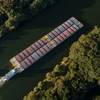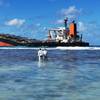SkanReg Quality Drive Boosts PSC Performance
Quality initiatives launched last year by the London-based St Kitts & Nevis International Ship Registry (SKANReg) have prompted a major improvement in results from Port State Control inspections, with detentions reduced by up to 62 percent and deficiencies down by as much as 49 percent.
Now SKANReg is seeking support for further progress in a submission to the IMO’s Flag State Implementation (FSI) sub-committee ahead of its 20th session from March 26-30.
The registry says it is ‘a source of frustration’ that, with only a small number of ships operating within certain regions, even a single detention can result in targeting of its ships and adversely affect its PSC list ratings in some areas. It is suggesting a harmonized system of reporting PSC statistics to avoid distortions.
The proposal comes as SKANReg – operational since 2005 - steps up its bid to attain PSC Grey List status within the next 1-2 years and White List ranking within 2-4 years from now.
As part of this drive, the registry has successfully applied to the Voluntary IMO Member State Audit Scheme and is due to be audited in the second half of next year. Technical assistance has been offered by several countries, notably Australia and Turkey.
Alongside this, on February 21. the St Kitts & Nevis government became the 23rd signatory to the Maritime Labour Convention 2006, which sets out new working and living standards for seafarers. The convention needs backing by 30 countries and – following a surge of seven ratifications in the last six months – is now expected to come into force in the very near future.
Meanwhile, as reported in its paper to the FSI sub-committee, SKANReg enhanced its regulatory oversight in 2011 with a string of new measures that slashed ship detentions and deficiencies in the three main PSC regimes where its 320 SOLAS vessels operate.
Under the Paris MOU covering Europe and the North Atlantic, detentions were 62 percent lower – with eight last year against 21 in 2010 - and the detention rate was halved to 8.2 percent. Total deficiencies were down 49 percent, while the average number of deficiencies per inspection fell from 6.86 to 4.84 overall and to 3.16 among ships that were not detained.
Detentions under the Tokyo Asia/Pacific MOU were down 37 percent from 11 to 7 and the detention rate reduced from 17.19 to 7.4 percent. Total deficiencies fell by 29%, with the average number per ship down from 7.25 to 3.88 across the fleet and to 2.28 for non-detained vessels.
Inspections under the Black Sea MOU saw detentions fall by 55 percent from 11 to 5; the detention rate cut from 12.94 to 4.7 percent; total deficiencies down 20 percent; and average deficiencies per ship reduced from 6.0 to 3.8, or 3.2 excluding those on detained ships.










